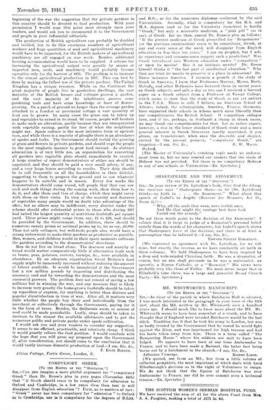COMPULSORY GREEK.
[To THE EDITOR Or Serurrroa."] Sm,—Can you imagine a more pitiful argument for "compulsory Greek" than Dr. Rouse's plea in your pages (November 18th) that " if Greek should cease to be compulsory for admission to Oxford and Cambridge, in a few years (less than ten) it will' disappear from English education "? First, as to matters of fact : " Greek " never has been compulsory for "admission " to Oxford or to Cambridge. nor is it compulsory for the degrees of B.Litt. and B.Sc., or for the numerous diplomas conferred by the said Universities. Secondly, what is compulsory for the B.A. and M.A. degrees (and so for the University franchise) is hardly "Greek," but only a miserable modicum, a "pink pill" (so to say), of Greek. Let us, then, amend Dr. Rouse's plea as follows: "If the present modicum of Greek prescribed for ' Responsions' (or the previous examination) cease to be compulsory, Greek, in any and every sense of the word, will disappear from English education in less than ten years." I am no prophet, but I ask, do experience and common-sense support such a prediction? Was Greek introduced into Western education under " compulsion " or upon its merits? Has it no intrinsic merits? Dr. Rouse himself thinks it " the best part of intellectual education." Why then not trust its merits to preserve it a place in education? Dr. Rouse instances America. I surmise a growth of the study of Greek in America; I know that Professors Murray, Myres, Bury, Mahaffy, and other Hellenists have lectured there in recent years on Greek subjects, and only a day or two ago I received a learned paper on a Greek subject from a Professor at Vassar College, which seems to show that the study of Greek is not yet extinct • in the U.S.A. There is still, I believe, an American School at Athens; indeed, the voluntaryists, America, France, Germany, have supported their schools in Athens much more liberally than our compulsionists the British School. If compulsion collapse here, and if (as, perhaps, in Scotland) a slump in Greek ensue, we may thank our compulsionists for that. Let us rather expect, however, a rise in the lower standard of Greek study and a more general interest in Greek literature (partly nourished, if you please, on translations), when once the discredit and disgust, excited by the present panacea, "compulsory Greek." are
[The Master of University's crushing reply needs no endorse- meat from us, but we may remind our readers that the study of Hebrew has not perished. Yet there is no compulsory Hebrew in any of our schools or Universities.—En. Spectator.]


































 Previous page
Previous page